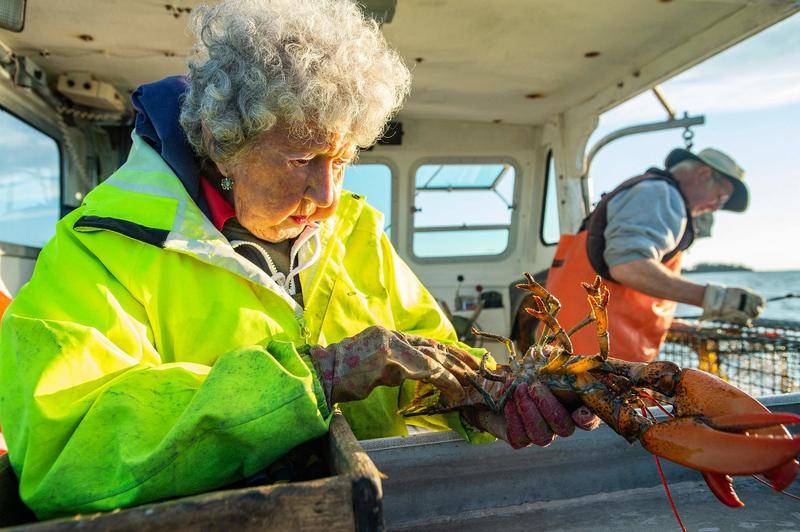Virginia Oliver has been trapping lobster in the northeastern American state of Maine for more than 90 years.
90多年来,维尔吉尼娅·奥利弗一直在美国东北部的缅因州捕龙虾。
And even at 101 years old, she says she has no plans to stop.
即使她已经101岁了,她说她也不打算停止。
Oliver recently told The Associated Press she started catching lobsters at age eight.
奥利弗最近告诉美联社,她从八岁开始捕龙虾。
At that time, the electronic traffic signal was a recent invention and few women were harvesting lobsters.
在那个时候,电子交通信号刚被发明,很少有妇女在捕龙虾。
Oliver still goes out to set traps off Rockland, Maine, with her 78-year-old son Max.
奥利弗仍然会和她78岁的儿子马克斯去缅因州的罗克兰设置陷阱。

She uses a boat that once belonged to her late husband.
她使用的船曾经属于她已故的丈夫。
The boat, called "Virginia," was named after her.
这艘名为“维尔吉尼娅”的船就是以她的名字命名的。
Oliver is now the oldest lobster fisher in the state and possibly in the world.
奥利弗现在是该州甚至可能是全世界最年长的捕龙虾者。
"I've done it all my life, so I might as well keep doing it," she told the AP.
她告诉美联社:“我已经做了一辈子了,所以我还不如继续做下去。”
Oliver said she worries about the health of Maine's lobster population.
奥利弗说,她担心缅因州龙虾种群的健康状况。
She said the lobsters have been facing heavy fishing pressure in recent years.
她说,近年来,龙虾一直面临着巨大的捕捞压力。
The lobster industry has changed over Oliver's many years on the water.
在奥利弗在水上生活的这么多年期间,龙虾业已经发生了变化。
For example, the sea creatures have grown from a working class food to a tasty delicacy.
比如,这种海洋生物(龙虾)已经从工人阶级的食物变成了美味佳肴。
When she first started trapping, lobsters sold for 28 cents a pound.
当她第一次开始捕龙虾时,龙虾的售价是每磅28美分。
Now, they bring in 15 times that.
现在,他们的收入是那时的15倍。
Wire traps have replaced her beloved wooden ones, which these days are mainly used as decorations in seafood restaurants.
钢丝陷阱已经取代了她心爱的木制陷阱,如今木制陷阱主要用作海鲜餐厅的装饰品。
Other parts of the business have remained much the same over the years.
多年来,这项事业的其他部分基本保持不变。
She still loads up pogeys—a term used in the industry for menhaden fish—to put inside the traps to lure lobsters in.
她还会把pogeys(行业中用来指鲱鱼的术语)装进陷阱里来引诱龙虾。
And, she still gets up before the sun rises to get an early start on the boat.
而且,她仍然会在太阳升起之前就起床,早早地出发去船上。
In some ways, she was destined for this life.
在某种程度上,她注定要过这种生活。
Her father was a lobster dealer who started around the 1900s.
她的父亲是20世纪初开始经销龙虾的商人。
She joined her father on trips and that is when Oliver's love of the business began.
她和父亲一起去旅行,也就是从那时起,奥利弗开始喜欢上了这项事业。
Wayne Gray, a family friend who lives nearby, said Oliver had a minor health problem a few years ago when a crab bit her finger.
住在附近的一位家族朋友韦恩·格雷说,几年前,奥利弗的健康状况出了点小问题,当时她的手指被螃蟹咬了。
The incident required her to have seven stitches.
这件事让她缝了七针。
But even then, she did not think about retiring her lobster traps.
但即使在那时,她也没有考虑过放弃捕龙虾的工作。
Gray said, "The doctor admonished her, said ‘Why are you out there lobstering?'"
格雷说:“医生责备她,‘你为什么要去捕龙虾?’”
Oliver answered, "Because I want to."
奥利弗回答:“因为我想去。”
After all these years, Oliver still gets excited about a lobster dinner of her own and said she usually prepares one for herself about once a week.
这么多年过去了,奥利弗仍然对自己的龙虾晚餐感到兴奋,她说她通常大概每周会为自己准备一次龙虾晚餐。
When asked whether she sometimes considers ending her work, Oliver said she just does not see any good reasons to do so.
当被问及她是否有时会考虑退休时,奥利弗说,她只是没有想到什么好的理由可以让自己退休。
"I like doing it, I like being along the water," she said. "And so I'm going to keep on doing it just as long as I can."
她说:“我喜欢这样做,我喜欢沿着水走。所以只要我能做,我就会继续做下去。”
I'm Bryan Lynn.
布莱恩·林恩为您播报。
译文为可可英语翻译,未经授权请勿转载!












